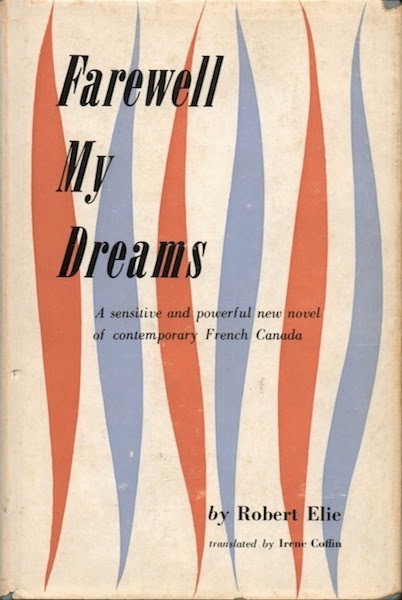Farewell My Dreams [La fin des songes]
Robert Élie [trans. Irene Coffin]
Toronto: Ryerson, 1954
Farewell My Dreams isn't a title I would've used; "The End of Dreams", the most literal translation, works just fine. No wispy romance, this debut novel is one of the most depressing and rewarding books I've read this year – and there are just thirty-seven more days to go.
Friends in youth, Marcel Larocque and Bernard Guerin enter middle-age connected only through respective marriages to sisters Jeanne and Nicole. No one is happy. Pudgy Marcel, a Montreal journalist, stares too long at his wife's youngest sister and dreams of past infatuations. Privileged Bernard, a lazy lawyer, wanders aimlessly, half-hoping that something will interest. When offered a seat in Quebec City, he goes through the motions, but stops in his tracks at the sign of the first obstacle. Meanwhile, the wives suffer.
Though the plot suggests otherwise, this is much more than a novel of mid-life crises. Démon de midi takes on new meaning as Marcel's mental illness, so very subtle in the early pages, comes to dominate his actions.
Six decades after first publication, La fin des songes remains in print; not so the English-language translation. I doubt this has anything to do with Irene Coffin, though her work is clumsy and talents ill-suited. The language is stilted, her dialogue peppered with words like "shall" and "forsooth".
Yes, forsooth.
Beaver Hall Hill is "Cote Beaver Hall" and Montreal's great commercial street appears variously as "Ste.-Catherine" and "Sainte-Catherine". The biggest gaff of all comes when the translator has Bernard announce that he is looking to be elected federally.
My advice? Read it in the original if you can. Read the translation if you can't. Either way, you'll be both depressed and rewarded.
A coincidence: Remember Douglas Sanderson's The Deadly Dames? Sure you do. That's the thriller in which a woman is killed by a streetcar rounding Peel and Ste-Catherine. Well, the very same corner features in La fin des songes:
He stopped a taxi which took him to the corner of Peel and Ste.-Catherine. The street-cars were making an infernal din and the crowd, as dense as at noon, flowed slowly. He landed in a tavern where smoke and bad lighting gave the beer drinkers a phantom-like appearance. It suited his mood well, but Bernard began to laugh. "I surely am not going to live in the atmosphere of detective stories."The critics rave: La fin des songes received the Prix David and has been described as the great novel of la Grande Noiceur. Reception of the English-language edition was enthusiastic – the exception being a critic I know only as "A.G.P.". Here he is in the 4 March 1955 edition of the Quebec Chronicle-Telegraph:
When the psychologically sound people must face a reality that continues to be fairly rugged and seek escape through the medium of fiction, to depress them with neurotic maunderings is to substitute a stone for nourishing bread.The critic later provides these words of advice:
There is an abundance of material in French Canada for more cheerful and more constructive themes. Judged by the standards of Mr. Elie's [sic] literary school these may be less dramatic but, so far as I have been able to feel their collective pulse, the contemporary reading public, by a large majority, want to be amused and to laugh. At the very least, it would be interesting for him to provide this sort of escape by way of change of pace, if nothing more.A.G.P. makes the mistake of identifying Bernard as "Bertrand". Pay him no mind.
Object: An attractive 213-page hardcover bound in pale blue cloth with burgundy print, my copy belonged to my father. The dust jacket sells other Ryerson novels by Ada Pierce Chambers, Will R. Bird, Gaie Taylor and E.M. Granger Bennett. I'm a proud owner of the Bird title – bought for a buck last year in London.
 |
| (Cliquez pour agrandir) |
Though uncommon. decent copies of the Ryerson edition begin at under ten dollars. One copy – and only one copy – of the American edition, published in 1955 by New York's short-lived Bouregy & Curl, is on offer for US$14,
La fin des songs is currently available from Bibliothèque Québécoise, For some reason, I prefer Fides' earlier Bibliothèque Canadienne-Français edition, even though the building on the cover does not appear in the novel. I purchased mine through the mail from a Montreal bookseller who claimed it was signed by Élie.
It wasn't… and the condition was much worse than described.

















